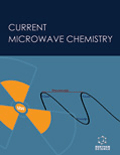
Current Microwave Chemistry
Scope & Guideline
Igniting Collaboration in the World of Microwave Chemistry
Introduction
Aims and Scopes
- Microwave-Assisted Synthesis:
The journal emphasizes the use of microwave technology to enhance synthetic methodologies, leading to improved yields and reduced reaction times in organic and inorganic chemistry. - Green Chemistry Principles:
A consistent focus on green synthesis methods is present, promoting environmentally friendly practices such as the use of bio-based solvents and catalysts. - Biomedical Applications:
Research exploring the application of microwave technology in the biomedical field, particularly in tissue engineering and the synthesis of bioactive compounds. - Catalysis and Reaction Optimization:
The journal covers advancements in microwave-assisted catalytic processes, including C-H activation and other bond-forming reactions, highlighting the efficiency of microwave energy in catalysis. - Multicomponent Reactions:
A significant area of focus involves multicomponent reactions facilitated by microwave heating, showcasing the versatility and efficiency of these synthetic strategies.
Trending and Emerging
- Sustainable and Eco-Friendly Approaches:
Recent publications show a significant increase in research focused on sustainability, including the use of renewable resources and green chemistry principles in microwave-assisted synthesis. - Biomedical Applications of Microwave Technology:
There is a growing trend towards utilizing microwave technology for biomedical purposes, particularly in the synthesis of materials for tissue engineering and drug delivery systems. - Nanotechnology and Microwave Synthesis:
Emerging research highlights the synthesis of nanomaterials using microwave methods, indicating a trend towards the development of novel nanostructures with unique properties for various applications. - Integration of Machine Learning in Synthesis Optimization:
An increasing number of studies are exploring the integration of machine learning techniques to optimize microwave-assisted synthesis, reflecting a trend towards data-driven methodologies in chemical research. - Advanced Catalytic Systems:
There is a notable rise in research focusing on advanced catalytic systems that utilize microwave-assisted techniques, indicating a shift towards more sophisticated and efficient catalytic processes.
Declining or Waning
- Conventional Synthesis Methods:
There is a noticeable decrease in publications focusing on conventional synthesis methods as researchers increasingly favor microwave-assisted techniques for their advantages in efficiency and sustainability. - Basic Research on Microwave Interactions:
Research centered on the fundamental interactions of microwaves with materials has become less frequent, as the focus shifts towards practical applications and advanced synthetic methodologies. - Non-Green Solvent Synthesis:
Papers discussing the use of non-green solvents in synthesis have diminished, reflecting a broader trend towards environmentally sustainable practices in chemical research. - Single-Step Reactions Without Catalysis:
There has been a decline in studies focusing solely on single-step reactions without the incorporation of catalytic processes, suggesting a move towards more complex and efficient synthetic strategies.
Similar Journals
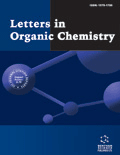
LETTERS IN ORGANIC CHEMISTRY
Innovating Research, One Letter at a TimeLETTERS IN ORGANIC CHEMISTRY is a distinguished journal published by Bentham Science Publishers Ltd, focusing on the rapidly evolving field of organic chemistry. Established in 2005, the journal commits itself to disseminating vital research findings, reviews, and innovative methodologies that contribute to the understanding and advancement of organic chemistry and biochemistry. With an ISSN of 1570-1786 and an E-ISSN of 1875-6255, this journal enhances accessibility and visibility for authors and readers alike, albeit not adopting an open-access model. Positioned within Q4 quartile rankings for both Biochemistry and Organic Chemistry, it serves a niche audience keen on exploring emerging trends and breakthroughs in these disciplines. Its Scopus rankings further reflect its role in the global academic landscape, albeit at the beginning stages of its impact journey. Based in the United Arab Emirates, LETTERS IN ORGANIC CHEMISTRY is dedicated to fostering dialogue among researchers and practitioners, paving the way for future innovations in organic and biochemical sciences.

CCS Chemistry
Empowering Global Chemistry Research Without BarriersCCS Chemistry, published by the esteemed Chinese Chemical Society, is a leading open-access journal dedicated to advancing the field of chemistry. Since its inception in 2019, the journal has rapidly gained recognition, achieving a remarkable impact factor that places it in the prestigious Q1 category in Chemistry (Miscellaneous) as of 2023. With a Scopus ranking of #41 out of 408 in General Chemistry, CCS Chemistry represents the top 10th percentile in its category, reflecting its commitment to high-quality research and innovation. The journal serves as a vital platform for researchers and professionals to share their findings, showcase cutting-edge methodologies, and engage with the latest developments in various chemistry subfields. Accessible to a global audience, CCS Chemistry ensures that groundbreaking research is available without barriers, making it an indispensable resource for students and academics aiming to stay at the forefront of chemical sciences. For further details, submissions, and access to published articles, please visit the journal's website.

BIOORGANIC & MEDICINAL CHEMISTRY LETTERS
Connecting disciplines for impactful chemical research.BIOORGANIC & MEDICINAL CHEMISTRY LETTERS, published by PERGAMON-ELSEVIER SCIENCE LTD, is a leading journal in the fields of biochemistry, drug discovery, and medicinal chemistry, designed to disseminate significant advances in these disciplines. Established in 1991, the journal spans various important categories, including Organic Chemistry and Pharmaceutical Science, with its 2023 Scimago Journal Rank placing it at Q2 in Organic Chemistry and Q3 in several other relevant fields. Though not an open-access publication, it provides invaluable insights into contemporary research and innovative methodologies, appealing to researchers, professionals, and students alike. The journal's commitment to quality and relevance makes it a vital resource for those aiming to stay at the forefront of bioorganic and medicinal chemistry developments. For more information, please visit the journal's website as it remains a critical platform for scholarly exchange, particularly for those engaged in interdisciplinary research.

REVUE ROUMAINE DE CHIMIE
Exploring New Frontiers in Chemical ScienceREVUE ROUMAINE DE CHIMIE is a distinguished academic journal in the field of chemistry, published by EDITURA ACAD ROMANE in Romania. With an ISSN of 0035-3930, this journal has been a valuable platform for disseminating original research and insights in the diverse realm of chemistry since its inception. The journal currently operates under a competitive tier, categorized in Q4 for miscellaneous chemistry fields, as reflected in its Scopus ranking of #348 out of 408, placing it within the 14th percentile. Aiming to foster scientific discourse and innovation, the REVUE ROUMAINE DE CHIMIE provides a repository of knowledge that is crucial for researchers, professionals, and students eager to advance their understanding and contribute to the global chemistry community. By bridging local and international research initiatives, this journal plays an essential role in enhancing the visibility of Romanian scientific contributions on the world stage.

Heterocyclic Letters
Unveiling Innovations in Heterocyclic ResearchHeterocyclic Letters is an esteemed journal in the field of synthetic organic chemistry, published by RAMAN PUBL. With ISSN 2231-3087 and E-ISSN 2230-9632, this journal aims to disseminate original research and innovative findings related to heterocyclic compounds, which play a crucial role in medicinal chemistry, material science, and agricultural chemistry. Heterocyclic Letters provides a platform for researchers, professionals, and students to share their insights and advancements, thus fostering academic collaboration and knowledge transfer. The journal is dedicated to maintaining high-quality standards in research publication, making it an essential resource for anyone focused on the latest developments in heterocyclic chemistry. Although it does not currently offer Open Access options, the journal’s rigorous peer-review process ensures that only the most credible and impactful studies are published, contributing significantly to the advancement of the field.
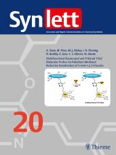
SYNLETT
Advancing the Frontiers of Organic SynthesisSYNLETT is a prominent academic journal dedicated to the field of Organic Chemistry, published by GEORG THIEME VERLAG KG. Since its inception in 1989, the journal has played a critical role in advancing the understanding of synthetic methodologies and organic compounds, offering a platform for innovative research and discoveries. With an ISSN of 0936-5214 and an E-ISSN of 1437-2096, SYNLETT is well-regarded in the academic community, presently positioned in the Q3 quartile for Organic Chemistry according to the 2023 category rankings. The journal is particularly valuable for researchers and professionals seeking insights into contemporary organic synthesis methods and their applications. Although it does not operate under an Open Access model, it remains a crucial resource within the field, contributing to significant advancements and collaborations globally. For those engaged in organic synthesis, SYNLETT not only encapsulates cutting-edge research but also inspires innovation in the discipline.
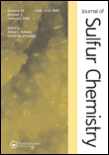
Journal of Sulfur Chemistry
Illuminating the World of Sulfur ChemistryThe Journal of Sulfur Chemistry, published by Taylor & Francis Ltd, is a pivotal resource dedicated to the field of sulfur chemistry, offering a unique platform for researchers, professionals, and students alike to explore innovative discoveries and advancements. With an ISSN of 1741-5993 and an E-ISSN of 1741-6000, this journal has been a prominent contributor to the academic discourse since its inception in 2004, converging knowledge and research through the year 2024. Recognized in the 2023 Scopus rankings, it holds a strong position at Q3 in the category of miscellaneous chemistry, ranking #173 out of 408, within the 57th percentile, underscoring its role as a valuable asset in the chemistry community. Although the journal does not currently offer open access, it remains a vital source for novel insights and scholarly articles, significantly impacting ongoing research and education in sulfur chemistry.
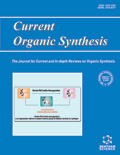
CURRENT ORGANIC SYNTHESIS
Unlocking the Secrets of Organic CompoundsCURRENT ORGANIC SYNTHESIS, published by Bentham Science Publishers Ltd, is a leading journal in the field of organic chemistry and biochemistry that serves as a vital platform for researchers and professionals advancing the synthesis of organic compounds. With an ISSN of 1570-1794 and an E-ISSN of 1875-6271, it boasts a significant impact within its category, ranked in the Q3 quartile for both biochemistry and organic chemistry as of 2023. The journal covers innovative research and reviews that enhance our understanding of organic synthesis methodologies, showcasing contributions that advance the field. Operating from Sharjah, United Arab Emirates, CURRENT ORGANIC SYNTHESIS has evolved since its inception in 2005, providing access to a wealth of information essential for students, professionals, and researchers alike. While it currently does not offer open access, the journal continues to maintain a strong community of scholars dedicated to fostering dialogue and innovation in the organic sciences.
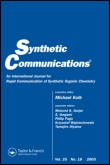
SYNTHETIC COMMUNICATIONS
Empowering Researchers with Key Insights in SynthesisSynthetic Communications, published by Taylor & Francis Inc, stands as a pivotal resource in the field of organic chemistry since its inception in 1971. With an ISSN of 0039-7911 and an E-ISSN of 1532-2432, this journal has established a commendable reputation, holding a Q3 ranking in organic chemistry by 2023, reflecting its contributions to the discipline and positioning it within the 50th percentile according to Scopus rankings. Targeted towards researchers, professionals, and students alike, Synthetic Communications aims to disseminate significant advancements in synthetic methodologies and reactions, facilitating the exchange of innovative ideas and enhancing collaborative efforts in the scientific community. Although not an open-access journal, it offers a wealth of valuable research content that is crucial for anyone dedicated to pushing the boundaries of organic chemistry.
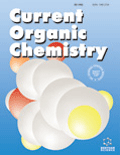
CURRENT ORGANIC CHEMISTRY
Advancing the Frontiers of Organic ChemistryCURRENT ORGANIC CHEMISTRY, published by Bentham Science Publishers, stands as a pivotal platform in the field of organic chemistry, providing innovative insights and advancements since its inception in 1997. With an ISSN of 1385-2728 and an E-ISSN of 1875-5348, this esteemed journal has carved a niche in the academic landscape, currently ranking in the Q3 category for Organic Chemistry according to the 2023 metrics. Operating from the United Arab Emirates, it engages a diverse audience of researchers, professionals, and students by delivering quality peer-reviewed articles that cover a broad spectrum of organic chemistry research. Although the journal does not offer open access, it remains a respected source of knowledge, indexed in Scopus with a percentile ranking of 43, encouraging rigorous discourse and the dissemination of cutting-edge findings. With continuous publication through 2024, CURRENT ORGANIC CHEMISTRY is dedicated to advancing the frontiers of organic chemistry research and technology.